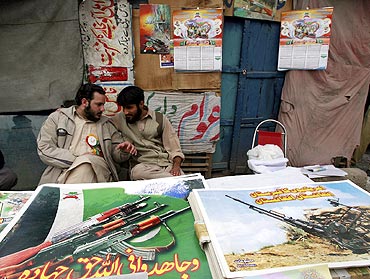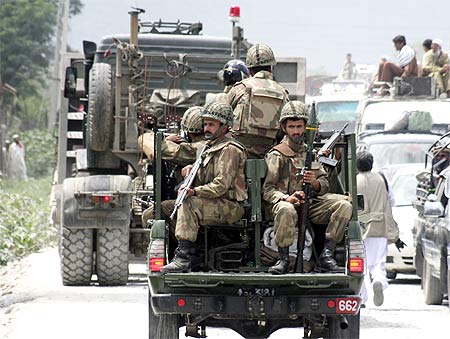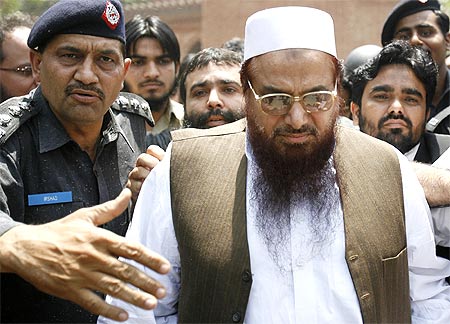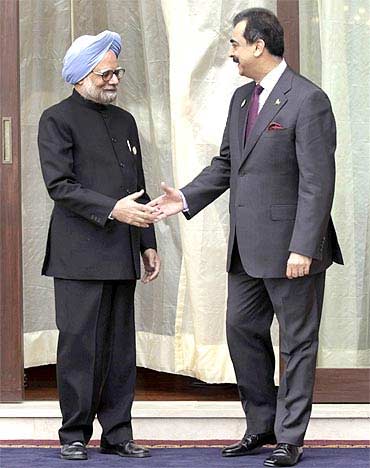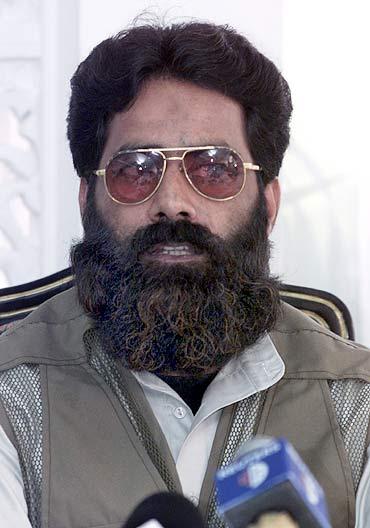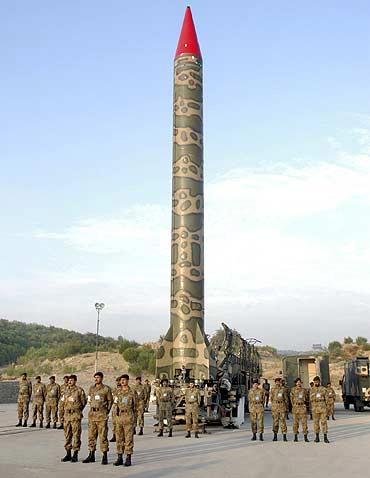 | « Back to article | Print this article |
'America must rework its relationship with Pakistan'
Since its release last month, Central Intelligence Agency veteran and senior adviser to four Presidents on Middle East and South Asian issues Bruce Riedel's new book, Deadly Embrace: Pakistan, America and the Future of Global Jihad, has been creating waves in administration, Congressional, think tank and diplomatic circles. The book is filled with rare insights and the author's no-holds-barred recommendations on how the United States can extricate itself out of this deadly embrace.

You mentioned that it was Strobe (Talbott, deputy secretary of state in the Clinton administration and now president, The Brookings Institution) who had suggested the title of your book.
I thought Strobe's idea for the title captured beautifully in two words the complexity of this relationship, the contradictions in this relationship, and above all, how this relationship has been poisoned for America and for Pakistan. So, Deadly Embrace seemed to me to be a beautiful title.
Are you advocating the US get out of this deadly embrace? Is it possible?
We need to transform our relationship with Pakistan to a positive embrace, where we are working to help build Pakistani democracy, help those forces in Pakistan who want to resist jihadism and the dark forces, keep the Pakistani army in the barracks and help Pakistan normalise its relationships with Afghanistan, and, above all, with India.
The big idea for America in the 21st century in South Asia has to be to build a South Asia which puts war and terror behind it and puts trade and transit in front of it.
'America has pursued a schizophrenic policy towards Pakistan'
There's the story of someone getting hold of the tiger's tale and the tiger taking off so fast that you can't let go of it even if you want to. Is that the case with Pakistan as far as the US is concerned? A deadly embrace that Washington cannot simply extricate itself out of even if it wants to?
It's certainly been the case for many, many years. For good reasons and bad reasons, America has pursued a highly schizophrenic policy towards Pakistan. What we need now is constancy and consistency, support for the democratically elected leadership of Pakistan, with all their warts. Because we've tried the generals and that's how we got into the mess we're in. So, we have to help Pakistan help itself.
There are some people in this town, looking at the unraveling situation in Pakistan and reminiscing nostalgically about the good old days of the Pakistani generals when things seemed less complicated and there were fewer people to essentially deal with. Can't it be argued that this offered perhaps a more pragmatic strategic scenario, even if it were totally contrary to America's democratic values?
The generals are the reason we are in the mess we are in today. Each Pakistani military dictator, above all Zia-ul Haq, but all four of them, have steadily moved the country towards a more radical outlook. They have harbored Islamic extremists, they have played Russian roulette and plotted war after war with India that's how we got into this mess.
We know what Pakistani generals can do. We know that they will produce a Pakistan that is not healthy. They've had four opportunities and that's what they have done. One of the tragedies in Pakistan is that the armies can't run the country, but they won't let anyone else run the country. We shouldn't slip into that mistake again.

The good old days of the generals were not good old days. It was they who produced the global Islamic jihad.
It's become almost a clich now that Pakistan is the epicenter of terrorism. You in fact coined the phrase 'syndicate of terror'. Is there any possibility of it letting up, or is it going to exacerbate even further because it's a Frankenstein's monster that's gripped Pakistan by its jugular to the extent that this genie cannot be put back into the bottle anymore?
The battle for the soul of Pakistan is underway between the dark forces, the syndicate of terror and their allies in the Pakistani establishment. And those who still believe in Muhammad Jinnah's vision of a Pakistan, which is a moderate, modern democracy in which anyone could practice their faith.
The outcome of that battle is crucial to the globe in the 21st century. It's easy to be pessimistic and to assume that the dark forces will win.
I am an eternal optimist because the Pakistani people have fought back against dictatorships time and time again and brave Pakistani like (former Pakistani prime minister) Benazir Bhutto, with all her faults, like the governor of Punjab (Salman Taseer, assassinated for his liberal views by his fanatical Islamic bodyguard), with all his faults, are the kind of people we need to support.
'Pakistan is the epicenter of international terrorism'
I certainly from well before that have been saying and writing that Pakistan is the epicenter of international terrorism, that the syndicate of terror was a threat to the survival of Pakistan.
If my contribution to the President's first (Af-Pak) review focused on anything, it was more to understand the nature of the Pakistani challenge and the imperative of changing US-Pakistan relations than any other single issue.
You've also always argued about the perfidy of the ISI and written about how you are convinced of the ISI hand and connivance in the Mumbai terror attacks by unleashing its surrogate, the Lashkar-e-Tayiba
The evidence of an ISI role in the planning of Mumbai mounts continuously. How far up in ISI, we still don't know. How far up in the Pakistani army, we still don't know. But connivance in the long effort to plot that attack, which we now know about so much from (Pakistani-American Lashkar operative) David Headley, I think is pretty clear.

Are you convinced that this alliance between the ISI and the Lashkar is still very much alive and well? While the ISI may have created the Lashkar, could it be that it no longer holds its reins?
No one who's not in the ISI today can tell you exactly what's going on. But we have a long track record and I don't see any reason to believe that the history of ISI's relations with Lashkar-e-Tayiba and other groups like that has substantially changed.
Why is that? Is it because the Pakistani military's concept of strategic depth vis- -vis India through proxy wars via groups like the Lashkar is still very much a priority?
The ISI has seen groups like Lashkar-e-Tayiba as assets in asymmetric warfare with India. They have seen them as useful for creating a strategic depth. They have believed that the US will cut and run in Afghanistan and Pakistan.
Until we change those beliefs we are not likely to see the ISI get out of the business of being a patron sponsor of terrorism. In my book, I argue the US now needs to draw specific red lines and make clear what is totally unacceptable. And then, if we identify Pakistani intelligence officers involved in support of international terrorism, we should put their names on the list that the United Nations puts out of international terrorists and abettors of international terrorism.
We should put them on America's lists, we should make it personal. I think that is the 'or else' that we've been missing for a long time.
Headley mentions a Major Iqbal as his handler. Do you believe that this Major Iqbal should be put on these lists by the UN and the US?
If we could find out who Major Iqbal is, absolutely he should be on the list. After all, half-a-dozen American citizens were murdered in Mumbai.
'US shouldn't mediate between Pakistan and India'
Pakistan, its military and the ISI still believe it's India that is Pakistan's primary existential threat and not terrorism. You mentioned at your book launch how (Pakistan's chief of army staff) General (Ashfaq) Kayani proudly talks about the fact that he is the most India-centric general. So, can this perception ever dissipate and India not be looked at as Pakistan's most dire threat?
It won't be easy. It's not going to happen overnight. But creative diplomacy--working with India and others like China, like Saudi Arabia -- I believe in time can change the strategic formulae that Pakistan has. I don't see an alternative to doing that. It's a very difficult challenge but it's the big idea that American diplomacy needs to promote in South Asia today.
You've argued that the most recent Af-Pak Strategic Review released by the Obama White House got it only half right. That the portion that was not addressed is how to help Pakistan deal with India. You've argued for Obama to broker a rapprochement between Delhi and Islamabad. But how do you do it when India goes ballistic when it gets even a whiff of such and effort by Washington?
We all know about how the Indians reacted when it was rumored that (the late former special representative to Afghanistan and Pakistan Richard) Holbrooke's original brief was to include India which necessarily translates into trying to resolve the Kashmir imbroglio?
We don't announce that we are going to mediate. We shouldn't mediate between Pakistan and India. What we should be is cheerleader, facilitator, and supporter. President Obama has spent the last two years building a relationship of trust with (Indian) Prime Minister (Manmohan) Singh. I think that's money well put in the bank for the future. Where we go now has to be subtle it can't be coercive. It has to be with India, not against India.
But how? Because for all the subtlety or good intentions and sincerity, whenever India gets even a whiff about efforts at such involvement whether it's mediation, facilitation, creative diplomacy or whatever it really annoys New Delhi.
That's why I believe the President was smart to build a relationship with the prime minister so that the two of them can have highest and serious discussions, as I believe they already had on these issues--out of the glare of publicity, quietly, behind the scenes.
We are not going to tell the Indians what to do. But India, after all, has a bigger stake in a healthy Pakistan than we do. So what we've got to do is to help them as they try to work their way through these problems. Again, I'd start with the small--transit rights, trade facilitation, the famous bus, things like that. Moving on those things to see if we can get back to what we were before Mumbai.
'A jihadist Pakistan is not imminent'

I am not suggesting that solving Kashmir solves all the problems between India and Pakistan. Clearly, it won't.
On the other hand, not addressing the Kashmiri issues leaves ne of the big issues between these two countries unaddressed. I believe we need a more complex dialogue.
It's not just about Kashmir by any means. It's about normalising the relationship between India and Pakistan. Here are two countries that share the same subcontinent, but it's almost impossible to go from one capital to the next.
Usually if you want to go from Mumbai, or you want to go from New Delhi to Islamabad, you go to Dubai. That's not normal. We ought to try to help them fix small things like that as a means to start moving toward big things --more fundamental issues. Not because that will solve all the problems in the world, but it sure would help solve some of the problems.
Are you fearful that as Steve Cohen predicted in a recent interview with the Council on Foreign Relations Pakistan will disintegrate? And does the assassination of the Punjab governor and the Pakistani government's reticence to even address the blasphemy (law) issue, let alone repeal it (the law), clearly indicate that the extremists are on the offensive? People like Sherry Rehman, who was pushing for amendments to the blasphemy law, have gone into hiding fearing for their lives.
I am much more worried that the dark forces in Pakistan are going to take the country over. In my book, I talk about thinking the unthinkable ---the jihadist Pakistan.
I think that's a much more likely outcome than a country that just disintegrates and becomes Somalia. Pakistan is not Somalia. Fortunately, I don't think a jihadist Pakistan is imminent. Not inevitable, but I think it's a real possibility for the first time in Pakistani history and it's another reason why we need to help those forces in Pakistan who want to return to Mohammad Jinnah's vision of a democratic, modern and moderate Pakistan succeed in their battle over the dark forces in Pakistan.
'Pakistan's nukes are a nightmare'
How concerned are you over the safety and security of Pakistan's nuclear arsenal? Every time this concern is raised with senior Pentagon officials, they dismiss these fears and declare that the Pakistan military has assured them of their safety and security.
It's the fastest-growing nuclear arsenal in the world. If Pakistan is taken over by the dark forces--the jihadists--they will get the arsenal as well. It's simple as that. That's the big nightmare.
There are a lot of concerns for an individual weapon falling into terrorist hands. Pakistan has done a lot to make sure that can't happen. The bigger question is whether Pakistan--if Pakistan becomes a jihadist state--will be a jihadist state with the fastest-growing nuclear arsenal in the world.
And those who say that we should then somehow secure them are living in a fantasy world. There is no secure Pakistani nuclear arsenal option. That's why it's imperative that we help those in Pakistan who are fighting the dark forces.

Do you feel that there has been the kind of serious thinking in US administration circles and proactive contingency plans on tap for a failed Pakistan or a jihadist Pakistan with a massive nuclear arsenal? On how to quickly foreclose on such an unraveling situation and make sure it never happens?
If they are reading my stuff, and I am pretty confident they are, they have thought about it. What plans they have made, I am not witting of, nor at liberty to speak to it.
India is concerned about a premature US withdrawal from Afghanistan, particularly with the ISI-supported Afghan Taliban still very much a force to be reckoned with and with all of the talk and efforts of reintegration and reconciliation. Are India's deep concerns justified?
Do you believe that beyond all of the administration's rhetoric and appreciation of India's assistance in Afghanistan's development and infrastructure, there is a genuine effort to involve India strategically toward a solution in Afghanistan? Is this for real or are all of Washington's declarations just hype?
India is, and should be a major player on Afghanistan. It has historic ties with Afghanistan. It has invested an enormous amount of money in trying to help stabilise Afghanistan since 2001. It has every reason to be part of the process.
I believe the President has now made clear that we are engaged in a process of transitioning from NATO-led to Afghan-led and that that process hopefully will culminate in effective Afghan forces by 2014 and that we will be there after 2014, although not in a combat role. Stabilising Afghanistan is critical to the whole effort of stabilising Pakistan and stabilising South Asia.
I believe the President understands that. I know there are a lot of people in America who are war-weary and they think this mission is impossible. I think it's too soon to give up.
But with regard to the Obama administration involving India strategically in terms of a solution in Afghanistan, is this for real? Is India involved in a substantive way with the US in this effort? If so, how is Washington dealing with Pakistan's paranoia?
Pakistan's paranoia has to be dealt with through the way that I have laid out before and in my book. But, yes, making India part of the solution, I believe, is for real. When the President went to New Delhi and when he invited Prime Minister Singh to the White House, he made clear we are not trying to cut India out of Afghanistan.
